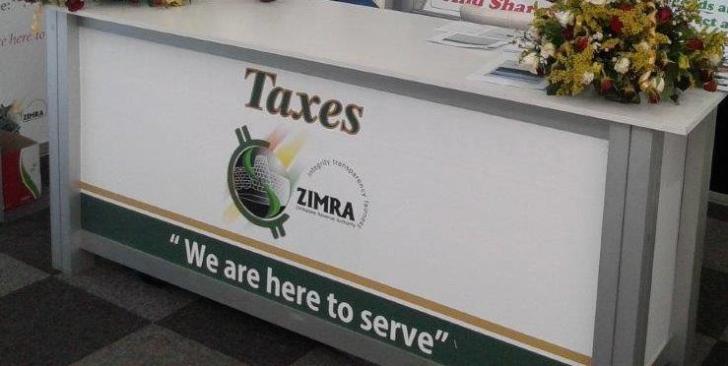News / National
Zim industry leaders call for Unified Taxation System
01 Jul 2025 at 07:20hrs |
0 Views

Zimbabwe's business community has raised concerns over the country's fragmented taxation system, urging the government to adopt a unified tax framework to alleviate the heavy burden of multiple taxes that are hindering business growth and expansion.
At the Zimbabwe National Chamber of Commerce (ZNCC) 2025 Annual Congress held last week in Victoria Falls, top industry captains stressed that the current multiplicity of tax obligations is increasing operational costs for companies, pushing some into corporate rescue or forcing them to shut down altogether. ZNCC Chief Executive Officer Chris Mugaga revealed that the chamber intends to advocate for the consolidation of tax policies into a single, harmonized tax system with a simplified rate structure.
"We need to have taxes reduced. We need to have harmonisation," Mugaga told NewsDay Business on the sidelines of the congress. "After this congress, we are going to push for consolidation of tax policies so that we have a single policy on taxes… We need just one tax rate, and we also need to push for slashing of taxes."
This call comes amid an aggressive audit and resource mobilization campaign by the Zimbabwe Revenue Authority (Zimra), which is determined to meet a challenging 2025 revenue target of ZiG equivalent to US$7.2 billion. The campaign has generated significant cost pressures on firms and has reportedly alienated some compliant taxpayers, as the government struggles with dwindling revenue streams due to the growing informal sector.
Mugaga pointed out that the government's overreliance on taxation as a revenue source is unsustainable given that only about 1,750 companies consistently pay taxes out of thousands registered in the country. This highlights the dominance of the informal sector, which the Reserve Bank estimates generates about US$14.2 billion annually.
Besides tax obligations, businesses are grappling with a range of other challenges, including the costs of alternative electricity sources amid persistent power outages, losses incurred from currency volatility, import duties, consignment-based conformity fees, high interest rates, commercial rents, municipal charges, legal and compliance costs, ICT expenses, software licensing fees, insurance premiums, and hedging costs related to economic uncertainty.
Industry leaders also voiced concerns about the influx of substandard products flooding the Zimbabwean market. Mugaga emphasized the difficulty in controlling the informal market and how the high cost of doing business has forced many consumers to turn to cheaper, often low-quality goods as a survival strategy. He called for stronger measures to regulate and address informality to protect both consumers and formal businesses.
CBZ Holdings chairman Luxon Zembe echoed these worries, underscoring the negative impact of cheap, poorly made products on local industries and the wider economy. He warned that although these goods might appear affordable, they tend to be short-lived and potentially dangerous due to inadequate manufacturing standards.
The consensus among Zimbabwe's business leaders is that tax reform, coupled with tighter regulation of market standards, is crucial to creating a conducive environment for sustainable economic growth. They are urging the government to rethink its approach to revenue generation and to focus on expanding the formal economy, reducing the tax burden, and protecting consumers and businesses from substandard imports.
At the Zimbabwe National Chamber of Commerce (ZNCC) 2025 Annual Congress held last week in Victoria Falls, top industry captains stressed that the current multiplicity of tax obligations is increasing operational costs for companies, pushing some into corporate rescue or forcing them to shut down altogether. ZNCC Chief Executive Officer Chris Mugaga revealed that the chamber intends to advocate for the consolidation of tax policies into a single, harmonized tax system with a simplified rate structure.
"We need to have taxes reduced. We need to have harmonisation," Mugaga told NewsDay Business on the sidelines of the congress. "After this congress, we are going to push for consolidation of tax policies so that we have a single policy on taxes… We need just one tax rate, and we also need to push for slashing of taxes."
This call comes amid an aggressive audit and resource mobilization campaign by the Zimbabwe Revenue Authority (Zimra), which is determined to meet a challenging 2025 revenue target of ZiG equivalent to US$7.2 billion. The campaign has generated significant cost pressures on firms and has reportedly alienated some compliant taxpayers, as the government struggles with dwindling revenue streams due to the growing informal sector.
Besides tax obligations, businesses are grappling with a range of other challenges, including the costs of alternative electricity sources amid persistent power outages, losses incurred from currency volatility, import duties, consignment-based conformity fees, high interest rates, commercial rents, municipal charges, legal and compliance costs, ICT expenses, software licensing fees, insurance premiums, and hedging costs related to economic uncertainty.
Industry leaders also voiced concerns about the influx of substandard products flooding the Zimbabwean market. Mugaga emphasized the difficulty in controlling the informal market and how the high cost of doing business has forced many consumers to turn to cheaper, often low-quality goods as a survival strategy. He called for stronger measures to regulate and address informality to protect both consumers and formal businesses.
CBZ Holdings chairman Luxon Zembe echoed these worries, underscoring the negative impact of cheap, poorly made products on local industries and the wider economy. He warned that although these goods might appear affordable, they tend to be short-lived and potentially dangerous due to inadequate manufacturing standards.
The consensus among Zimbabwe's business leaders is that tax reform, coupled with tighter regulation of market standards, is crucial to creating a conducive environment for sustainable economic growth. They are urging the government to rethink its approach to revenue generation and to focus on expanding the formal economy, reducing the tax burden, and protecting consumers and businesses from substandard imports.
Source - NewsDay
Join the discussion
Loading comments…


































